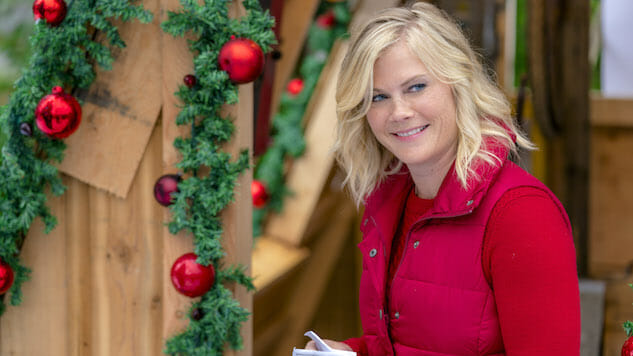Hallmark Channel Makes Content for Women, but Does It Allow Them to Create Enough of It?
Photo: Copyright 2017 Crown Media United States LLC/Photographer: Ricardo Hubbs
This Christmas, Hallmark Channel (and sister network Hallmark Movies & Mysteries) will premiere its annual Countdown to Christmas programming: In 2017, that means a whopping 21 original movies about the impending holiday season. All of them will star women; all of them will be viewed by women—last year’s record-breaking event saw ratings increase nearly 30 percent in women aged 18-49, and 22 percent in total viewers. But while there are notable exceptions, the films will still largely be made by men.
Statistically, much of Hallmark’s content is made by men. The network’s catalog of Christmas hits is majority man-made: An examination of the credits for each film aired during its mid-July “Christmas Keepsake Week” reveals that nearly 100 percent were directed by men, and the majority were written by men, too. (There were only three female directors on the entire schedule; one of them was Mariah Carey.)
The same goes for the network’s original series: When Calls the Heart, Chesapeake Shores, and the now-defunct Cedar Cove are all based on book series from female authors, but were brought to TV by mainly male EPs, directors and writers. The Good Witch, based on a popular Hallmark film series of the same name (created and directed by men), boasts plenty of female writers, but not a single female director in three seasons and three Halloween specials.
When Calls the Heart has had just three women-directed episodes out of the 39 produced so far, with women writers faring better (they’re credited on 18 of the hours). Chesapeake Shores has had four women-directed episodes (out of 17 examined for this story), but 10 women-written ones. During its time on air, Cedar Cove did not have a single female director in 36 episodes, though female writers were credited on 18 of them.
The statistics only tell part of the story, however. The network’s original movies, for example, are produced on a tight timeline with a tight budget. With such little room for deviation, it’s made sense in the past to hire experienced staff behind-the-scenes—and considering the demographics of the film industry in general, those proven crew members are likely to be white men.
But those original movies also tend to star the same talent onscreen—and the network is now providing many of its female stars (or “family,” in Hallmark parlance) with the opportunity to produce films of their own. While not an official mandate, both the network and one of its most prominent female hit-makers say that Hallmark is actively courting women to produce, write and direct films and TV series.
“We pride ourselves on how our programming is created, written, developed and produced by women that connect with all of our viewers, Michelle Vicary, Crown Media’s executive vice president of programming and publicity, said in a statement to Paste. “We are one of the leaders in television dedicated to empowering women and providing females the opportunity to thrive both on and off screen.”
Alison Sweeney, the former Days of Our Lives star-turned-director, novelist and The Biggest Loser host, began working with Hallmark in 2010. Almost immediately, network brass offered her the opportunity to produce her own films.
“They offered right from the beginning for me to bring them ideas. And so it kind of just happened organically,” Sweeney says.
Since then, she’s brought them scripts to develop and they’ve come to her with others. While she originally only signed on to star in the popular Murder She Baked series, she eventually became a producer on the project. In 2017, she executive produced her latest Hallmark Christmas movie, Christmas at Holly Lodge, which was written and directed by women (Melissa Salmons and Jem Garrard). Sweeney says it was important for her to champion a script written by a woman, and she specifically sought out a female director for the project.
“I met quite literally zero resistance,” she says. “I absolutely think it’s important right now to make sure that women are being equally hired and given that opportunity in this industry that has been so predominantly male.”
-

-

-

-

-

-

-

-

-

-

-

-

-

-

-

-

-

-

-

-

-

-

-

-

-

-

-

-

-

-

-

-

-

-

-

-

-

-

-

-








































